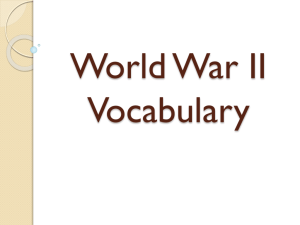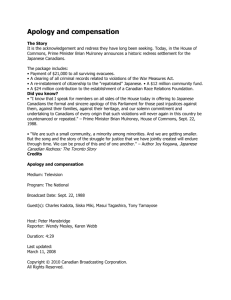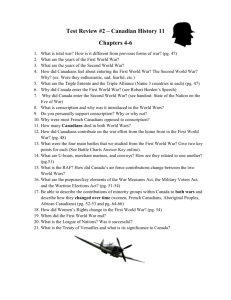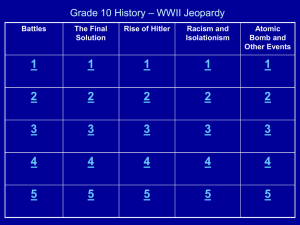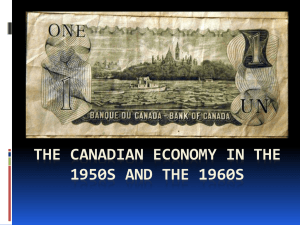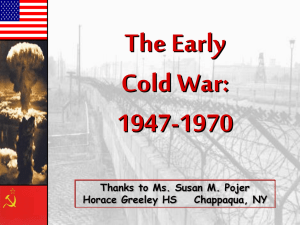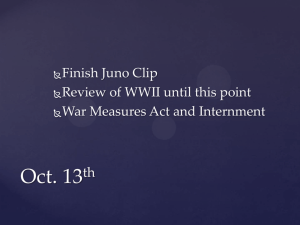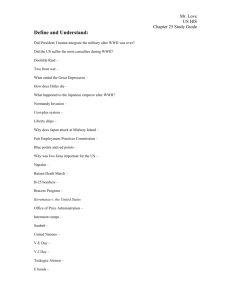WWII 20 questions ppt
advertisement
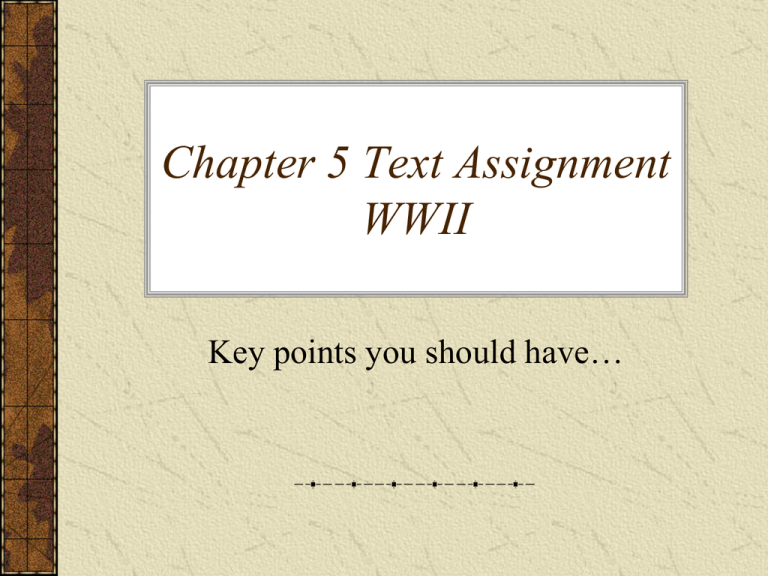
Chapter 5 Text Assignment WWII Key points you should have… Terms Blitzkrieg: lightening attack Zombies: conscripted Canadians who never served overseas Appeasement: the policy of agreeing to the demands of another in order to avoid conflict or hostility Referendum: (plebiscite or vote) submitting an issue to a direct vote of the people Terms Imperialism: the policy of extending the rule of one country over another country or territory Baby Boomers: people born between 1945 and 1965 Corvettes: small fast warships built to accompany merchant fleets/ convoys 1. How did Canadians react to the beginning of WWII? How was this different from WWI? Reaction to WWII Mood was somber No slogans heralding glories of war Realities of WWI were known Canada waited a week after Britain as an act of sovereignty 2. How did technology change between WWI and WWII? Technological changes: Air power-bombings Weapons of mass destruction now included the atomic bomb WWII Bombers Hurricane Mk. XII for the RCAF Avro Lancaster MK-1 3. Explain Canada’s roles in both the air and the Atlantic. Canada’s roles in the war in the Atlantic: Defend Canadian coastline Serve as protective escort for convoys crossing Atlantic 1943- RCAF bombers joined in the protection of convoys 3. Explain Canada’s roles in both the air and the Atlantic. Canada’s contribution to the war in the air: a) Running the British Commonwealth Air raining Plan (BCATP) from 1939-45 at over 200 sites across Canada b) Provided air support during the Battle of Britain c) Served in Allied Bomber Command and participated in the bombing of German cities Dresden •The bombing of Dresden in February 1945 • One of the more controversial aspects of WWII •Many thousands of civilians in the firestorm that was created by the Allies. 4. How did the navy change between 1939-45? Canada’s Navy 1939- 6 destroyers, 5 minesweepers, 2 training ships, 3500personnel 1945- 4th largest navy in the world 373 warships 100 000+ personnel Canada’s Navy Barracuda being moved between decks Ice formed on deck from ocean spray Anti-aircraft guns (Oerlikons) being fired 5. Who were the Merchant Marines and why are they called the unsung heroes of WWII? The Merchant Marines were Canadian sailors who served on merchant vessels transporting supplies to the Allied forces They were not given the same benefits as war veterans even though they had directly entered combat zones 6. What happened at Dieppe? Why? What was Canada’s involvement? Dieppe was an attempted raid by Allied force on the coast of France in 1940 Limited invasion by sea Intended to reduce pressure on Russia by diverting German forces Was a disaster- “surprise” attack failed 3500 Canadians attacked 900 died and 1900 became POWs, others wounded. Dieppe 7. What was Operation Overlord? When and where did it happen? How successful was it? What was Canada’s role? Operation Overlord (D-day, Normandy, Juno Beach) Canada landed at Juno Beach By day’s end had gained more ground than any other Allied division Operation Overlord Clip 8. Read pg 62- Voices. What 2 agreements were reached? Explain what each was about. Ogdensburg: agreement created a Permanent Joint Board of Defense to protect the northern half if the northern hemisphere 1941 Hyde Park Declaration established a plan for Canada and the USA to coordinate purchase of military arms and supplies 9. When and what was VE day? V-E day Victory in Europe May 7, 1945 Germany surrendered (Japan did not) VE Day Images 10. What happened to Canadians at the battle of Hong Kong? Battle of Hong Kong 1900 Canadians were stationed here lost after 3 weeks of fighting Unprepared- untested soldiers 500+ died in battle or were in Japanese POW camps after this battle POW Camps 11. How did WWII finally end in August of 1945? WWII ended after the USA dropped 2 nuclear bombs called “little boy” and “fat man” on Japan Hiroshima (August 6, 1945)killed 90,000–166,000 Nagasaki (August 9th, 1945)- killed 60,000–80,000 Japan surrendered on August 14, 1945 Hiroshima Little Boy Nagasaki Fat Man 12. Do you agree with the use of the atomic bomb to bring about a quick end to the war? Explain. 13. List the changes that occurred to the Canadian forces in WWII in relation to a) women b) African Canadians c) Aboriginals d) French Canadians. Changes in Canadian forces: Women were actively recruited for all branches of the armed forces but were not allowed to serve in direct combat (still paid less than men in the same roles). African Canadians were now accepted into the military and were not segregated into non-combative battalions- integrated throughout military Aboriginal Canadians had to have the permission of the Department of Indian Affairs in order to enlist. They were also required to give up their status as Aboriginals. 3000+ chose to sacrifice their status to fight. French Canadians enlisted in greater number. 19% of the military. 14. What 4 economic policies did the Canadian government implement in order to avoid runaway inflation 4 economic policies: a) Wage and price controls b) Rationing c) Increased taxation d) Policies to finance war without massive borrowing from other nations Ration cards 15. How did women benefit from economic changes during the war? Women benefitted from economic changes during the war: a) Secured jobs in traditionally male dominated occupationsearned twice that of women in traditionally female jobs b) Minority women now had opportunities to work in factories alongside Caucasian women. Factory, logging and shipyard Workers 16. Explain in some detail how PM MacKenzie- King handles the conscription crisis in WWII. Prime Minister Mackenzie King and Conscription a) 1940- National Resources Mobilization Act (single men 18-45 register for home defense) b) 1942 Referendum to release government form promise of conscription if necessary c) Asked for voluntary enlistments d) 1944 mobilized Zombies and sent 13,000 overseas. 2500 reached battlefields. Mackenzie- King’s Platform “ Conscription if necessary, not necessarily conscription.” 17. Consider the situation for Japanese Canadians during WWII: When where and why were they put into camps? What did they lose beside their freedom? What happened in 1988? Do you think the government’s response (in 1988) was appropriate? Why or why not? Japanese Canadians: The War Measures Act was again invoked After Pearl Harbor the Japanese became the primary target (blatant prejudice) 22,000 Japanese Canadians were displaced from their homes and moved to internment camps/ labor camps in the BC interior Lost all possessions, homes, businesses, land. Government reneged on promise to return these possessions 1988- apology from government and $21, 000 for each surviving internee Japanese Internment 18. How did Canada deal with European Jews fleeing the Nazis before and during the war? Canada’s response (or lack thereof) to European Jews: a) Denied the entry request for 10,000 Jews to immigrate to Canada in 1938 b) Refused the refugee ship St. Louis safe harbor in 1939 c) Only admitted 5000 between 1939-1945 (one of the worst records worldwide) 19. What happened in 1947 to improve Canada’s nation status? In 1947 Canada's nation status improved when the country secured a seat as an independent nation at the United Nations It became the first Commonwealth Nation to define it’s citizens as Canadians first and British second 20. After 1945 what did the government do to ensure the prosperity created during wartime? After 1945 to ensure continued the prosperity of wartime Canadians enjoyed new social programs such as: a) Unemployment Insurance (now called EI) b) Pensions c) Family Allowance Benefits Works Cited 1945, February. "The Bombing of Dresden." History Learning Site. Web. 28 May 2010. <http://www.historylearningsite.co.uk/bombing_of_dresden.htm>. 1945, February. "The Bombing of Dresden." History Learning Site. Web. 28 May 2010. <http://www.historylearningsite.co.uk/bombing_of_dresden.htm>. "Asia Exile - Times Online - WBLG: The Luckiest or Unluckiest Man in the World? Tsutomu Yamaguchi, Double A-bomb Victim." Comment Central - Times Online - WBLG. Web. 26 May 2010. <http://timesonline.typepad.com/times_tokyo_weblog/2009/03/the-luckiest-or.html>. "Asia Exile - Times Online - WBLG: The Luckiest or Unluckiest Man in the World? Tsutomu Yamaguchi, Double A-bomb Victim." Comment Central - Times Online - WBLG. Web. 28 May 2010. <http://timesonline.typepad.com/times_tokyo_weblog/2009/03/the-luckiest-or.html>. "City of Toronto Archives: V-E Day and V-J Day in Toronto." Toronto.ca | Official Website for the City of Toronto. Web. 28 May 2010. <http://www.toronto.ca/archives/ve1.htm>. "Dieppe - Veterans Affairs Canada." Veterans Affairs Canada - Anciens Combattants Canada. Web. 28 May 2010. <http://www.vac-acc.gc.ca/remembers/sub.cfm?source=history/secondwar/dieppe>. "Google Image Result for Http://www.skylighters.org/veday2004/vjkiss.jpg." Google. Web. 27 May 2010. <http://www.google.ca/imgres?imgurl=http://www.skylighters.org/veday2004/vjkiss.jpg&imgrefurl= http://www.skylighters.org/veday2004/index.html&h=600&w=452&sz=32&tbnid=ztf5u2DZkBTGo M:&tbnh=259&tbnw=195&prev=/images?q=victory+in+europe+day+famous+photos&hl=en&usg=_ _ySSkb8eK9BpyD6NfFhf0o2-8ivo=&ei=qSP_S8rAAsT_lgf8uMXCQ&sa=X&oi=image_result&resnum=1&ct=image&ved=0CBwQ9QEwAA>. Images, Using. "Canadian WWII Propaganda Posters." British Commonwealth Air Training Plan: WWII CATP Air Museum. Web. 28 May 2010. <http://www.airmuseum.ca/postscan.html>. "Japanese Canadian Internment." Wikipedia, the Free Encyclopedia. Web. 28 May 2010. <http://en.wikipedia.org/wiki/Japanese_Canadian_internment>. Works Cited "Japanese Internment Camps in Canada." Yukon Education Student Network - Home. Web. 28 May 2010. <http://www.yesnet.yk.ca/schools/projects/canadianhistory/camps/internment1.html>. News, Cbc. "CBC News - Canada - D-Day: The Allied Invasion of Normandy." CBC.ca - Canadian News Sports Entertainment Kids Docs Radio TV. Web. 28 May 2010. <http://www.cbc.ca/canada/story/2009/06/02/f-ddayhistory.html>. "On This Day In History January 1 - 31 (Rome, Egypt, Influence) - U.S. and World, Studying Past, Wars, Presidents, Language, Economy - Page 2 - City-Data Forum." Stats about All US Cities - Real Estate, Relocation Info, House Prices, Home Value Estimator, Recent Sales, Cost of Living, Crime, Race, Income, Photos, Education, Maps, Weather, Houses, Schools, Neighborhoods, and More. Web. 28 May 2010. <http://www.citydata.com/forum/history/854697-day-history-january-1-31-a-2.html>. "Parks Canada - Image." Parcs Canada | Parks Canada. Web. 28 May 2010. <http://www.pc.gc.ca/apprendrelearn/prof/sub/jpn/diverse/img7_e.asp>. "Presentation Hurricane on Flickr - Photo Sharing!" Welcome to Flickr - Photo Sharing. Web. 28 May 2010. <http://www.flickr.com/photos/hawk914/535335593/>. "Prisoners of War - Veterans Affairs Canada." Veterans Affairs Canada - Anciens Combattants Canada. Web. 28 May 2010. <http://www.vac-acc.gc.ca/general/sub.cfm?source=history/secondwar/fact_sheets/pow>. "Proper Propaganda » Unconfirmed Assumptions." Mark Stokoe | Design. Web. 28 May 2010. <http://www.markstokoe.ca/fall/?cat=6>. "VE Day - Victory in Europe May 8th 1945." Historic UK - Heritage Accommodation in Castles,cottages,hotels,bed and Breakfast,boats,dream Weddings, Living History and History Magazine. Web. 27 May 2010. <http://www.historic-uk.com/HistoryUK/England-History/VEDay.htm>. "WWII Navy - From Boys to Men - Veterans Affairs Canada." Veterans Affairs Canada - Anciens Combattants Canada. Web. 28 May 2010. <http://www.vac-acc.gc.ca/REMEMBERS/sub.cfm?source=collections/d
